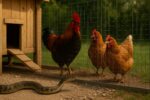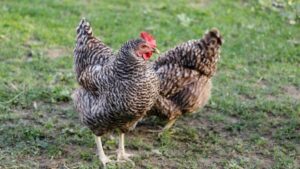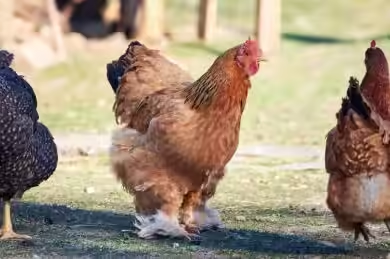Last updated on August 1, 2025
If you’ve been thinking about getting into chickens, or maybe you’re even a seasoned keeper looking to switch things up a bit, you’ve probably heard of Plymouth Rocks. And for good reason! Honestly, these birds are a staple in backyard flocks and small farms all across the U.S., and pretty much everywhere else, too. They’re that classic heritage breed – you know, the one with the striking barred plumage, friendly demeanor, and just an overall sense of being robust.
But here’s the kicker, and I hear this a lot: many folks really wonder if they’re truly cut out for a free-range lifestyle. Can they actually handle the elements? Will they stick around, or just wander off? And, crucially, do they really pull their weight when it comes to finding their own food, or are they just glorified pets? Well, this guide is here to clear the air, diving deep into the honest, real-world benefits of letting your Plymouth Rocks roam. Forget the fluff; we’re talking tangible, on-the-ground reasons why Plymouth Rocks thrive when you give them that ample space. Trust me on this one.
Key Takeaways



- Plymouth Rocks are top foragers and reduce feed costs.
- They’re hardy in all weather and easy to manage.
- Calm, friendly, and great for families and mixed flocks.
- Consistent egg layers, even when free-ranging.
- Low-maintenance and long-lived.
“Plymouth Rocks are one of the best choices for backyard and free-range flocks because of their hardiness, calm temperament, and excellent foraging ability.”
— Dr. Jacquie Jacob, University of Kentucky Extension
Source
1. They’re Born Foragers: Smart, Curious, and Always Scratching
One of the first things you’ll ever notice about Plymouth Rocks? Their insatiable curiosity. Seriously, it’s something else. They’re not content to just stand around, you know, waiting for you to toss out feed. Oh no. These birds are natural explorers – constantly pecking, scratching, digging for whatever goodies the earth has to offer. It’s almost like a full-time job for them.
- Natural Instincts: Their keen eyesight and endless energy mean they’re absolute experts at spotting insects, worms, grubs, and seeds that other breeds might just plain miss. They particularly love working through leaf litter and freshly tilled garden beds. They work the soil, aerating it as they go, making them, well, little feathered farmhands. You’ll actually see the difference in your yard.
- Saving on Feed Costs: This isn’t just a quaint habit, by the way; it’s a huge economic benefit. In my experience, a free-ranging Plymouth Rock flock can seriously reduce your feed bill. For example, during prime foraging season (late spring through early fall), I’ve consistently noticed a significant drop in their commercial feed intake, from about 1 cup per hen down to as low as 0.4-0.6 cups per hen daily. Who wouldn’t love a grocery bill that shrinks? It’s a definite perk. It’s not just about what they can find, but how efficiently they find it. Want to know more about keeping costs down? Check out our guide on how to calculate chicken feed cost.
- Outperforming Other Breeds: While plenty of breeds enjoy foraging, Plymouth Rocks seem to possess an unmatched dedication to the task. They’ll spend hours meticulously working a patch of ground, often outperforming less vigorous foragers, say, your average White Leghorn, in a pasture rotation system. They don’t just forage—they vacuum your yard like feathery Roombas. They truly are self-sufficient chickens. You almost wonder if they’re secretly on a mission to find every last bug! However, and this is important, even the best foragers need supplemental feed, especially in leaner seasons or if your pasture isn’t as rich as theirs. Don’t expect them to live entirely off the land; that’s just not realistic. For more on the general advantages of letting your chickens roam, see this article on The Benefits of Free-Range Chickens.
2. Built for the Outdoors: Hardy in All Kinds of Weather
A free-range bird needs to withstand Mother Nature’s moods. Plymouth Rocks, well, they excel here. Their robust physique isn’t just for show, believe me. They’re built for it.
- Temperature Toughness: Whether it’s a sweltering summer or a biting winter, these chickens handle it. They are known as cold-hardy chickens due to their dense feathering and decent body mass, which provides excellent insulation. You’ll often see them dusting themselves in the sunniest spots in winter, or lounging under a big shade tree in summer, perfectly content. But they also adapt well to heat, as long as they have access to shade and plenty of fresh water. You’ll be amazed at their resilience! It’s genuinely impressive, almost defying expectations. Unlike some of the more delicate, ornamental breeds, Plymouth Rocks aren’t fussed by a bit of rough weather.
- Feather Density and Body Size: Their full, heavy feathering and sturdy build are natural defenses against the elements. They retain heat in winter and can dissipate it in summer, making them truly adaptable Plymouth Rocks. It’s like they come with built-in climate control. Pretty handy, right? Less stress for you.
- Resilience in Open-Air Setups: Unlike some more delicate breeds, Plymouth Rocks don’t easily succumb to common ailments when kept in open-air conditions. Their natural hardiness means fewer vet bills and a healthier flock overall. And honestly, who isn’t tired of constantly worrying about sick birds? That said, even the hardiest bird can get sick, and damp, muddy conditions can still pose a challenge, regardless of breed. So, don’t throw caution to the wind entirely, common sense still applies.
- Seasonal Free-Ranging Variations: Their outdoor behavior truly shifts with the seasons, which is fascinating to observe. In the warmth of spring, after the ground thaws, they’re constantly working the fresh soil, uncovering dormant insects and sprouting greens. Summer sees them foraging during cooler morning and late afternoon hours, often seeking shade under trees during the midday heat. Come fall, their focus shifts to fallen leaves, seeds, and any last insects before the ground freezes. In winter, they might spend less time actively foraging if snow covers the ground, sticking closer to the coop and relying more heavily on supplemental feed, but they’ll still venture out on milder days, picking at dry leaves or any exposed ground.
3. Calm But Confident: The Perfect Free-Range Temperament
You want a chicken that’s not going to panic at every shadow, right? But also one that isn’t so docile it becomes easy prey. Plymouth Rocks hit that sweet spot beautifully. It’s a balance, you see.



- Friendly with All: These birds are notoriously friendly. They’re generally easygoing with both their human keepers and their flockmates, minimizing pecking order squabbles. Ever seen a chicken flock where everyone just… gets along? It’s a real joy, I promise. It truly is. You’ll spend less time breaking up squabbles, and who doesn’t want that?
- Balanced Demeanor: They aren’t flighty like some of the lighter breeds, meaning you won’t constantly be chasing them down. (Trust me, nobody wants to play “catch the chicken” every evening.) But they’re also not overly passive, which can make a chicken vulnerable. This balanced temperament is key for a successful free-ranging life. Yet, some might argue that a highly alert, even slightly skittish breed, could be quicker to spot and evade a fast-moving aerial predator. What’s your comfort level with that trade-off? Something to think about, for sure. Compared to, say, a nervous Leghorn that might fly into a panic and get separated, a confident Plymouth Rock often handles unexpected disturbances with more composed awareness.
- Safe Around Kids: If you have a family, especially young children, you’ll really appreciate their calm nature. They’re generally easy to handle and won’t freak out if a child approaches them gently, making them an ideal backyard free-range chicken. It’s truly heartwarming to see kids interact with them. It’s pretty special, actually, watching that bond grow.
4. Predator-Smart Without Being Paranoid
Free-ranging inevitably comes with predator risks. This is where the Plymouth Rock’s street smarts really come into play. It’s a big deal.
- Awareness and Calmness: They possess a keen awareness of their surroundings without being overly skittish or prone to panic. They’ll alert the flock to potential danger, but they won’t necessarily scatter into individual, easy-to-catch targets. It’s like they have a built-in alarm system, but they don’t hit the snooze button. Thankfully. They’re smart, not frantic. This calm, collective response can actually be a huge advantage over breeds that might just blindly scatter, making them easier targets. In a real-world predator encounter, I’ve seen Barred Rock hens “freeze” or slowly move towards cover upon seeing a hawk, while other breeds might dash haphazardly, drawing more attention.
- Rooster Behavior: A good Plymouth Rock rooster is worth his weight in gold in a free-range flock. He’ll patrol, keep an eye out, and bravely stand his ground, often sacrificing himself to protect his hens. This predator-resistant chicken breed trait makes a massive difference. Seriously, it’s incredible to witness their protective instincts. It truly is something to behold, a real hero in the flock.
- Real Safety Tips: While they’re smart, you still need to be smart too. To complement their natural awareness, always provide ample cover – think dense bushes, sturdy structures, or even dedicated shelters your birds can duck into quickly. Get them into a secure, predator-proof coop every single night, without fail, especially at dawn and dusk when predators are most active. For ideas on robust housing, see our article on poultry farming design for 1000-10000 birds. For added layers of defense, consider motion-activated lights or, if your property allows, livestock guardian dogs, and browse helpful poultry farming equipment for security. For more extensive information on keeping your flock safe, refer to guides like Protecting Small Poultry Flocks from Predators. It’s about working with their natural intelligence, not relying solely on it. Because even the smartest chicken needs a little help sometimes! Some might argue that a more camouflaged or smaller breed might be harder for predators to spot. What’s your priority: a highly visible, confident bird, or one that blends in more? It’s a legitimate question you’ll need to answer for your specific situation.
5. Easy to Train and Coop-Savvy
A free-range setup only works if your chickens actually come home. Plymouth Rocks are excellent at this. Seriously. It’s a lifesaver.
- Reliable Return: They have a strong homing instinct. Once they learn their coop is where the food and safety are, they’ll reliably return each evening, often putting themselves to bed without any prompting. This ease of management is a major plus for free-ranging Plymouth Rock characteristics. Imagine not having to herd chickens at dusk! What a relief, truly. Many breeds are more prone to roosting in trees or getting lost, but Plymouth Rocks are remarkably consistent. That being said, I once spent a frustrating thirty minutes (felt like an hour, honestly) chasing a particularly stubborn Barred Rock hen who decided a high branch was far more appealing than her warm roost. She won that round, I definitely lost, but eventually, even she learned the routine.
- Coop Integration and Re-integration: When introducing young Plymouth Rocks to free-ranging, start by letting them out for short, supervised periods, gradually extending the time. This helps them imprint on the coop as their safe haven. If you ever have to house them temporarily (for injury, bad weather, or integrating new birds), re-integrating them into the free-range routine is typically smooth. Just a few days back in the coop and they’ll usually fall right back into the habit of returning at dusk.
- Easy to Fence: While they enjoy roaming, they’re not known for being high fliers. A standard chicken fence is usually enough to contain them if you need to restrict their range, and they won’t constantly be looking for escape routes. No Olympic-level high-jumpers here, thankfully. That saves a lot of headaches, and keeps them where you want them.
- Quick Learners: From learning a feeding call to understanding boundaries, they pick up routines quickly. This makes them one of the best chickens for beginners who are trying out free-ranging. It’s genuinely satisfying to see how quickly they adapt. Still, remember that consistency from you helps reinforce this behavior – even the smartest birds need routines! Don’t just expect them to figure it all out on their own; a little guidance goes a long way.
6. Get Along With Everyone: Great in Mixed Flocks
Introducing new birds can be stressful. With Plymouth Rocks, it’s usually a breeze. Surprisingly so. You might even call them diplomatic.
- Low on the Pecking Order: While they’re confident, they generally aren’t aggressive. They tend to find their place in the flock without excessive bullying or confrontation, reducing overall stress for other birds. I’ve seen firsthand how they can calm a whole group. It’s quite something, watching them just blend in. This makes them a superior choice for a multi-breed flock compared to more assertive or dominant breeds.
- Adapt Well: They adapt smoothly to new breeds joining the flock, integrating quickly and calmly. I’ve personally introduced various breeds alongside my Barred Rocks (a variety of Plymouth Rock), and they’ve always been the peacekeepers, helping new birds settle in. Never a major issue, and that makes life easier for everyone.
- Reduced Stress: Their docile chicken breed for free-range nature means less fighting, less stress, and a more harmonious environment for all your birds. This makes your flock dynamics much more pleasant to manage. Who needs drama in the coop, right? However, every flock has its unique personalities, and even the most docile breed can have an occasional troublemaker. It’s worth observing initial interactions carefully. Just a heads up, and be prepared to step in if needed.
7. Eggs Galore! High Production Even in Free-Range Systems
Many people worry that free-ranging might reduce egg output because the birds are spending time foraging instead of eating commercial feed. With Plymouth Rocks, that’s rarely the case. It’s a common concern, I know, but often unfounded.




- Consistent Layers: These ladies are egg-laying machines, consistently delivering 200–280 large brown eggs per year. That’s a serious breakfast supply! Imagine the omelets. The quiches. You get the idea. Your fridge will be full.
- No Output Drop: Because they’re such efficient foragers, they supplement their diet with natural protein and nutrients, which actually supports their egg production rather than hindering it. The added exercise and varied diet often lead to healthier, happier hens. It’s a win-win, right? Seems pretty obvious when you think about it. Happy hens lay better, it’s just how it works.
- Quality Eggs: You’ll get large brown eggs with strong shells, perfect for eating, baking, or sharing with friends and family. There’s just something special about a farm-fresh egg, isn’t there? The yolks are often richer, a deep golden hue that really stands out thanks to their varied diet. However, it’s fair to consider that a highly specialized layer breed like the Lohmann Brown might produce a few more eggs in optimal conditions, but would they offer the same robust free-range benefits? It’s all about balancing your priorities, and sometimes a few less eggs are worth the overall resilience.
8. Do They Offer Both Meat and Eggs Efficiently?
For small farms or homesteaders looking for sustainability, the dual-purpose nature of the Plymouth Rock is a huge advantage. It really is. You get more from your birds.
- Great Carcass Weight: These birds grow to a good size, providing a respectable amount of meat for the table once their egg-laying days slow down. They offer substantial carcass weight, making them ideal for home use. Talk about getting bang for your buck! It’s a truly efficient system, reducing waste.
- Still Productive Layers: They aren’t one-trick ponies, you know. Even as they mature into excellent meat birds, the hens continue to be very productive layers during their prime. This makes them truly efficient dual-purpose free-range chickens.
- Ideal for Small Farms: If you’re aiming for self-sufficiency or just want to minimize your reliance on external sources for food, a breed that provides both eggs and meat is incredibly valuable. They fit perfectly into a sustainable farming model. It’s a pretty neat package, if you ask me. Of course, a dedicated broiler breed will grow faster, and a dedicated layer will produce more eggs, but few offer such a balanced package. It’s a give and take, always, but the Plymouth Rock offers a great middle ground.
9. Are They Low Maintenance with a Long Lifespan?
Who wants a chicken that’s constantly sick or demanding endless attention? Not me! And probably not you either. I certainly don’t. Our time is valuable, after all.
- Fewer Health Issues: One of the standout reasons Plymouth Rocks thrive in free-range environments is their inherent hardiness. When they have access to varied forage and plenty of space, they often experience fewer health issues than their confined counterparts. Their natural diet and exercise boost their immune systems. It’s almost like they know what’s good for them. Nature’s wisdom, eh? Saves you a lot of worry. This robust health often means they outlast breeds known for more delicate constitutions.
- Low Vet Bills: Less sickness means less need for medication or veterinary intervention. They’re genuinely low-maintenance chickens, cutting down on potential costs and worries. What a relief, seriously! Every little bit helps the budget, right?
- Strong Genetics: Their robust genetics contribute to a generally longer, healthier life, allowing you to enjoy their eggs and companionship for years to come. This breed is truly built to last. It’s a testament to their heritage. But let’s be real, “low maintenance” doesn’t mean “no maintenance.” Regular health checks and a clean coop are still essential for any happy flock. You still have to do your part, of course, but it won’t feel like a constant battle.
Want a complete care guide? Read our full Plymouth Rock Chicken Guide for everything from health to housing!
Potential Challenges of Free-Ranging Plymouth Rocks (and How to Overcome Them)
While Plymouth Rocks are fantastic free-rangers, no system is entirely without its snags. It’s important to be prepared and proactive. Here are a few common challenges you might encounter and how to tackle them:




- Predation Risks: This is arguably the biggest concern for any free-range flock. Even with smart, alert Plymouth Rocks, predators like hawks, foxes, coyotes, and even domestic dogs can pose a threat.
- Mitigation: The golden rule is secure night housing. Ensure your coop is impenetrable, with no gaps, sturdy latches, and hardware cloth (not chicken wire) over openings. During the day, provide natural cover (dense shrubs, trees) or artificial shelters for quick escapes. If you have persistent issues, consider motion-activated lights, electric poultry netting, or a livestock guardian animal like a dog or donkey. Regular presence in the yard also helps deter opportunistic predators.
- Wandering Off/Boundary Issues: While Plymouth Rocks have a good homing instinct, an irresistible patch of grass on the neighbor’s side of the fence, or an open gate, can lead to wanderlust.
- Mitigation: Establish clear boundaries early. A simple fence can often suffice, as they aren’t strong fliers. Consistent training, like a specific call or treat at dusk, will reinforce their return to the coop. If you have a very large property, consider a rotating pasture system with portable fencing to keep them in desirable areas and allow other sections to recover.
- Crop Damage: Free-ranging chickens, Plymouth Rocks included, love to scratch and peck. This is great for pest control, but less so for your prize-winning petunias or freshly planted vegetable beds.
- Mitigation: Protect vulnerable areas with fencing. Chicken wire or bird netting can create exclusion zones for gardens. You can also offer designated “dust bath” areas or sacrificial garden patches to give them something to focus on. Sometimes, giving them a specific spot to forage, like a compost pile (ensure no toxic materials!), can divert their attention.
- Parasites & Health Management: While hardy, free-ranging birds are more exposed to external and internal parasites.
- Mitigation: Regular flock health checks are crucial. Keep an eye out for signs of mites, lice (ruffled feathers, irritation), or worms (pale combs, lethargy, poor egg quality). Implement a regular deworming schedule if necessary, and provide dust bathing areas with wood ash or diatomaceous earth to help them self-clean and deter external parasites. Good coop hygiene also plays a huge role.
Bonus: Should You Choose Plymouth Rocks for Your Free-Range Flock?
So, after all this, are Plymouth Rocks the right fit for your free-range setup? Here’s a quick checklist to help you decide. Take a moment with it.
- Do you want excellent foragers who help reduce feed costs? ✅
- Are you looking for calm, friendly birds good with kids? ✅
- Do you need chickens that can handle diverse weather conditions? ✅
- Is consistent egg production important to you, even with free-ranging? ✅
- Are you interested in a dual-purpose breed for both eggs and meat? ✅
- Do you prefer birds that are easy to manage and return to the coop? ✅
- Are you planning a mixed flock and need adaptable birds? ✅
- Do you want hardy, low-maintenance chickens with a long lifespan? ✅
If you answered “yes” to most of these, then Plymouth Rocks are likely an excellent choice for you. They excel in environments where they have ample space to roam, forage, and express their natural behaviors. They’re a fantastic option for small farms wanting sustainability and backyard chicken breeds alike. You really can’t go wrong.
Final Thoughts: Should You Go Free-Range with Plymouth Rocks?
Without a doubt, if you’re considering a free-range setup, Plymouth Rocks are a breed you should put at the top of your list. They’re a true testament to what a well-suited chicken can do when given the space to be themselves. It’s pretty amazing to watch. While many breeds are good free-rangers, Plymouth Rocks often offer a unique blend of calm temperament and robust hardiness that truly sets them apart from more flighty or delicate options you might encounter, such as certain Rhode Island Red varieties.
When they’re the perfect fit:



- You have enough space for them to roam safely.
- You appreciate their foraging abilities and the resulting feed savings.
- You desire a friendly, hardy, dual-purpose bird.
Possible challenges to plan for:
- Predator Management: While smart, no chicken is completely predator-proof. You still need secure night housing and vigilance. Don’t ever get complacent.
- Containment: While they don’t fly often, if your property borders a busy road, you might still need fencing to keep them away from danger. Better safe than sorry, right?
Final checklist before setting up:
- Secure Night Roost: Ensure a predator-proof coop for night.
- Water & Shade: Always provide fresh water and plenty of shade during the day.
- Supplemental Feed: Have supplemental feed available, especially during lean foraging times.
- Observation: Regularly observe your flock for signs of health or distress.
FAQs
Are Plymouth Rocks better than Rhode Island Reds for free-ranging?
Yes, for many free-ranging setups, Plymouth Rocks often offer distinct advantages over Rhode Island Reds. While both are excellent dual-purpose birds, Plymouth Rocks generally edge them out in terms of a more docile and calm temperament, making them slightly easier to handle and integrate into mixed flocks or family settings. Rhode Island Reds can be a bit more assertive. For pure egg-laying intensity, the Reds might have a slight lead, but for a balanced, friendly, and robust free-range chicken, many keepers, myself included, often lean towards the Plymouth Rock. It really comes down to your specific priorities, though.
Do free-range Plymouth Rocks need special care compared to other breeds?
No, free-range Plymouth Rocks generally require less special care than many other breeds. Their natural hardiness and strong foraging instincts mean they’re quite self-sufficient. Just provide a secure coop, plenty of fresh water, and some supplemental feed, and they’ll typically thrive. They don’t have unique dietary needs or a particular proneness to ailments that demand constant veterinary intervention, making them a pretty straightforward choice.





What are the main things to watch out for with free-range Plymouth Rocks?
The primary concerns for free-range Plymouth Rocks are predation and ensuring they consistently return to their coop at night. You need to be vigilant for predators like hawks, foxes, and raccoons, ensuring your coop is predator-proof. While they have a good homing instinct, accidental wandering can occur, so consistent training to return to the coop at dusk is important. Also, be mindful of potential crop damage to gardens and monitor for common parasites due to increased exposure.
What specific traits make Plymouth Rocks good at free-ranging?
Plymouth Rocks are excellent free-rangers due to their combination of strong foraging instincts, calm yet confident temperament, dual-purpose utility, and remarkable hardiness. They actively seek out food, handle diverse weather conditions well, are generally amiable in mixed flocks, and can serve as both reliable egg layers and decent meat birds. Their balanced nature makes them self-sufficient and adaptable. For more details, you can explore their specific Plymouth Rock chicken characteristics.
How does their temperament affect their free-range success?
Their balanced temperament is crucial for their free-range success. They are not overly flighty, which means they are less likely to panic and get lost or injured by panicked reactions. At the same time, they possess enough awareness and confidence to be alert to potential dangers without being skittish. This allows them to explore and forage efficiently while still responding to threats in a composed manner, often preferring to seek cover rather than scattering wildly.
Are free-range Plymouth Rocks good at finding their own food (foraging)?
Yes, free-range Plymouth Rocks are fantastic foragers. They have a strong natural inclination to scratch and peck, actively seeking out insects (such as grubs, worms, beetles, and grasshoppers), various seeds, weeds, grasses, and even small wild fruits or berries if available. This diligent foraging allows them to supplement a significant portion of their diet from the environment, leading to healthier birds and potentially reducing your commercial feed costs by a noticeable margin.
How well do free-range Plymouth Rocks handle different weather conditions?
Free-range Plymouth Rocks handle diverse weather conditions exceptionally well. They are known for being both cold-hardy and heat-tolerant. Their dense feathering provides excellent insulation in winter, and their sturdy build helps them adapt to summer heat, provided they always have access to shade and fresh water. This natural resilience makes them a versatile choice for many different climates.
Do free-range Plymouth Rocks provide good pest control?
Absolutely, free-range Plymouth Rocks are excellent for natural pest control. As active foragers, they will happily consume a wide variety of insects, grubs, and other small pests present in your garden or yard. This significantly helps in reducing pest populations without you needing to use chemical treatments, making them a beneficial addition to any property where pest management is a concern.
Are free-range Plymouth Rocks prone to wandering off or are they easy to manage?
Free-range Plymouth Rocks are generally not prone to wandering off and are quite easy to manage. They possess a strong homing instinct and reliably return to their coop each evening. Additionally, they are not strong fliers, so a standard fence is typically sufficient to define their roaming area, making them easier to contain compared to many other free-ranging breeds.
What are the benefits in terms of egg and meat production when free-ranged?
When free-ranged, Plymouth Rocks offer excellent dual benefits for both egg and meat production. Their foraging habits contribute to robust health, which supports consistent egg laying (200-280 large brown eggs per year) and can result in richer, more flavorful yolks. For meat, their active foraging helps them develop good carcass weight, making them efficient birds for home consumption once their egg production naturally declines.




Are there any common health issues or vulnerabilities for free-range Plymouth Rocks?
While generally hardy, free-range Plymouth Rocks can still be vulnerable to external and internal parasites due to their increased exposure to the environment. Common issues might include mites, lice, or worms. Predation is also a constant concern, necessitating robust nightly security measures for their coop. Regular health checks and proactive parasite management are key to keeping them healthy.
Are free-range Plymouth Rocks good with other animals or children?
Yes, free-range Plymouth Rocks are genuinely good with other animals and children. Their calm and docile temperament makes them friendly chickens, generally integrating well into mixed flocks without aggression. They are also quite tolerant of gentle interactions with humans, including children, and can coexist peacefully with other pets, provided proper introductions and supervision are in place.
How much space do free-range Plymouth Rocks need?
For optimal free-ranging, Plymouth Rocks ideally need at least 100 square feet per bird, though more space is always beneficial. This generous area allows them ample room to forage, exercise, and display natural behaviors, which helps reduce stress and supports their overall health and productivity. The more space they have, the better they can truly thrive.
What do free-range Plymouth Rocks eat when foraging?
When foraging, free-range Plymouth Rocks enjoy a wonderfully diverse diet. This includes a wide array of insects (such as grubs, worms, beetles, and grasshoppers), various seeds from plants, weeds, grasses, and even small wild fruits or berries if they’re available. They also enjoy kitchen scraps that you might offer. This natural diet complements their commercial feed, providing them with rich nutrients and contributing to the quality of their eggs and overall health.






